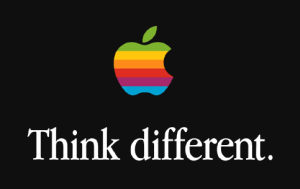Almost no one calls me in my office. 90% of the calls are my wife or a textbooks ales representative (poor souls- they are ever-optimistic.).
So, when the phone rang two weeks ago, I answered it very informally. “Unh, hello?”
“Is this Jordi?” I didn’t have time to realize I should have recognized the voice. “This is Mike Daisey.”
Now, some of my students doubted this phone call happened. I can assure you it did. Maybe Mike (Mr.Daisey? Etiquette fails me) is even reading this as he assured me he read all 64 blog posts by 32 of you over two weeks. And 100 last semester, I presume. I wished he would have commented for their sake, but I also understand that engaging in 164 individualized exchanges in 2 semesters is a lot to sign up for (I get paid for it!).
The highlights of the conversation.
1) He wanted me to let my students know he did read their posts. And he liked Gil’s use of a picture of Mike to “prove’ he is a “big, fat liar.” I think Mike was sincere in being amused.
2) He wanted me to make it clearer that he issue an apology to his audiences and other stakeholders (theater people, journalists and human rights activists, especially). You can read it here. The LA Times, at least. noticed it.
He writes about “loosing his grounding.”
Here is the end of it:
I speak about truth because it is what I aspire to. All my stories, even when I’ve fallen short, have been attempts to experience the truth with my audiences.I am sorry for where I have failed. I will look closer, be more patient, and listen more clearly.
I will be humble before the work.
I think some of you wanted more of a mea culpa from him then he offered (or was included) in the “Retraction” podcast.
3) I thanked him for both the the quality and the strength of the original The Agony and Ecstasy of Steve Jobs and for making that work available under a Creative Commons license. For those who think he may have wanted somehow to get “more fame” from TAESJ to line his pockets, you need to know that he makes no money from others performing that work.
From his website:
In a groundbreaking move, after over 200 performances in 18 cities over 19 months, a transcript version of THE AGONY AND THE ECSTASY OF STEVE JOBS was made available for free download in February 2012, and has been released under an open license so that it may be performed by anyone, anywhere, royalty free. It was a phenomenon, downloaded more than 100,000 in its first week, and to date has had over 35 productions, and been translated into six languages.
4) He offered to send me some links to other coverage of TAESJ and his apology. Still hoping to get it! 🙂
5) We discussed how Ira Glass and the other people at This American Life made their own choices about how to handle the problems with the original podcast. I shared that I am frustrated by the attempt to equate Daisey’s problems (lies, exaggerations, or appropriation of 3rd party material as his own experiences) with the overall truth of the issues in the play, which include of course our own love affairs with Apple technology and also the lesser known history of Apple and Jobs.
6) I explained that the tech/no performance of “un/real and un/true: The agony and the Ecstasy of Steve Jobs” was a polyvocal performance. We added various “interruptions” to the original script to bring many different viewpoints into the performance including other reporting about Foxconn and Apple, an interview where Steve Jobs dismisses concerns at the factories (“They have swimming pools” he says, I think), a fragment from an 19th century mill girl in America with similarities to the problems in China, a Chinese scholar’s reaction, and so on.
Do I Agree with Ira Glass?
I think part of Mike’s concern was also that the way the student posts ended with “Retraction” podcast implies that it is the end of the story. “The narrative doesn’t end there.” I agree with him.
There are so many other issues and changes in the overall “story” of technology (all companies!), Apple, China, globalization, capitalism, consumers, and development and justice. I won’t outline it all here, but just this week, I heard that Foxconn was going to open up its labor unions to freer elections. Is everything “fine” now? I don’t think so. Progress is not an excuse for complacency.
Mike did not say directly, but I wondered if part of his concern was that the nature of the assignment (from his viewpoint, reading these blog posts) was that perhaps I sided completely with Ira Glass and the TAL producers.
Here is the short answer: no.
I was one of the people who worked hard to see the play still performed here last fall when there were understandable concerns about having it all (especially after dealing with Greg Mortensen). But full credit to Pete Mackey, our VP of communications, who imagined that the original monologue AND the controversy around its truths and lies could be performed in a way that acknowledged it all. Technology, justice, globalization, China, Apple in an engaging play AND the issues of truth, art, knowledge, and journalism all in one moment! Yes, please!
Here is the longer answer:
Me, Teaching, Truth, and Social Construction
Look, when I teach, I try to be careful to leave plenty of “space” for student voices to come forth and express themselves. I balance this with some healthy amounts of my challenging or engaging a student to develop their ideas more in speech and writing, to go deeper, to be more sophisticated, and to ask hard questions. Sometimes, I reveal what I “really think” if I think it will provide new insight or will model a way of thinking. Maybe I am too careful not to make my views clear. Maybe I reveal too much of what I think. Bucknell students like to know the right answer. This is an ethics class after all. Maybe I should be arguing for what is clearly ethical or unethical.
So maybe Mike thought, based on how I structure the blog posts, that I fully agree with “Retraction.” Understandable. But I do not. My choices for how I structure the materials and assignments are about creating student experiences.
To have the full impact of the first podcast, followed by the impact of the retraction, followed by having to make one’s own decisions about what matters, about what is right or wrong in facts and in ethics, followed by having to grapple with who controls the narrative, followed by some uneasy reconciliation with this whole nexus of issues is a series of I think irreplaceable learning moments.
But I believe truth is situational and contextual. This was the origin of the other poll question that many of you answered. I am a dyed-in-the-wool social constructivist meaning that what we usually call “facts” are never universal and always have a history. All knowledge is socially constructed. This can perhaps make me seem like a naive relativist to some. The Opus Dei priest who was an ethics teacher for one higher education class certainly thought so and so failed me on an ethics exam. But I argued then and now that social constructionism does not mean “anything goes.” Knowledge and facts still must meet criteria of accuracy or worthiness before they are accepted by that knowledge community. The knowledge AND the criteria are themselves always a result of a social process of interested actors. There is no position from which to step outside of our constructed existence and objectively measure facts as “true”or not. But criteria and knowledge is the best we can do. And we should always try to make them better, whatever our field is.
One result of this approach to epistemology is an inherent pluralism in knowledge. Since there are many kinds of knowledge and many sets of criteria, what is good knowledge in one area may or may not be in another. How we judge “correct” literary theory is different from “correct” civil engineering from “correct” sociology.
So did Mike lie in parts of his monologue? Die he make mistakes or exaggerations (yes, yes). But did he LIE where lying is a deliberate act of deception? By the standards of journalism, yes. By the standards of theater, no. By the standards of utilitarianism, no if the amount of visibility raised far outweigh the cost of the lies. By the standards of a social movement to humanize the global economy, no.
Is there an easy answer to the question? No.
Related articles
- What Constitutes the Truth? (bizgovsoc6.wordpress.com)




